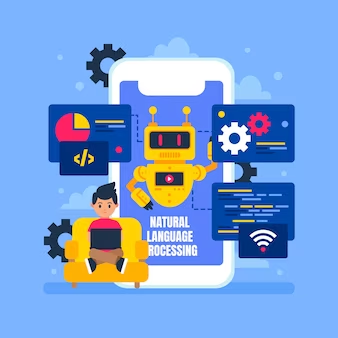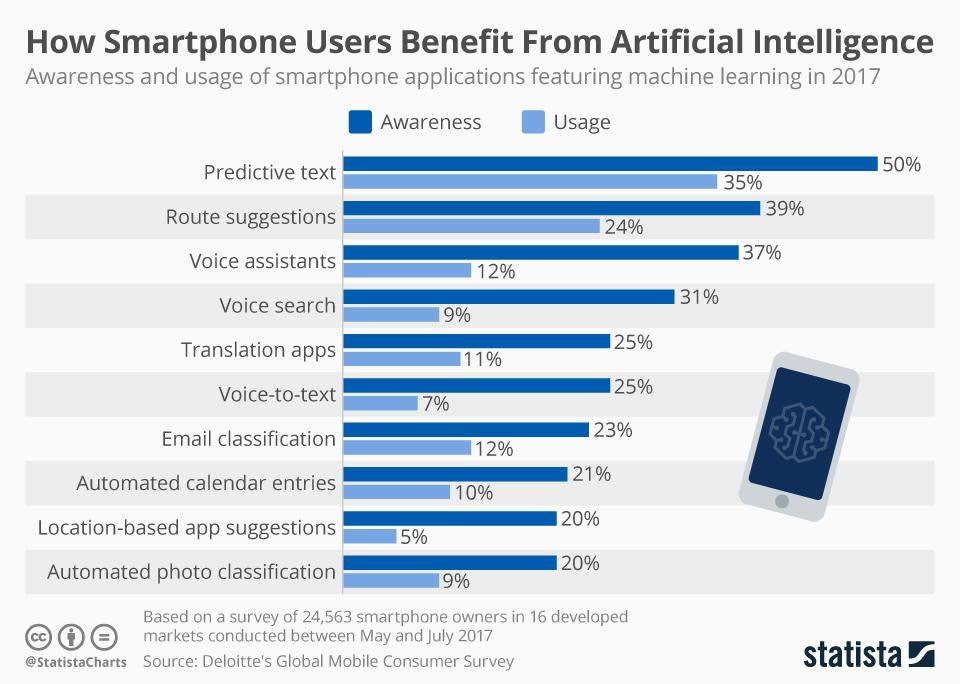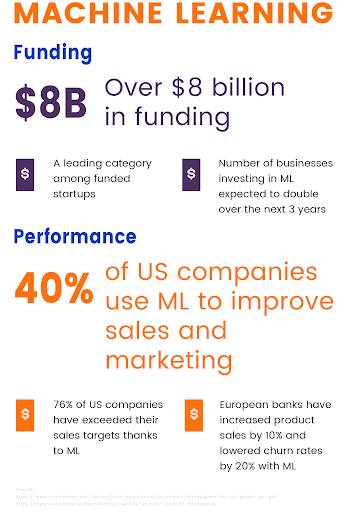Machine Learning in Mobile App Development – How Effective?
Delve into the effectiveness of machine learning in mobile app development and uncover its transformative impact on user experiences and functionalities

Machine Learning in mobile app development has transformed the outcomes, i.e., the mobile apps – some incredible transformation has been witnessed in the past few years.
Machine Learning (ML) and Artificial Intelligence (AI), together develop intelligent and highly smart solutions, which could even understand human behavior – and using that behavioral analysis and powerful algorithms. It deploys apps that have the capacity to entertain users, interact with them, and deliver a highly-personalized experience.
Let’s take ‘Facebook’ for instance here – it uses Machine Learning (and its tools) to understand the behavior of the people. And, that’s how they deliver a customized experience to the app users.
The ultimate purpose of identifying the behavior of people is to show them relevant ads, which will make them the potential users of other businesses, whom Facebook might have tied up with.
Another example is the shopping apps – where users simply point to an item and the shopping app will display all matching results. Machine Learning even helps in identifying the objects.
Just imagine, how crazily intelligent apps can be built with the integration of Machine Learning in mobile app development. Machine Learning has the potential to develop mobile apps that contents the user’s tastes.
And, that’s the ultimate objective of any business – to understand the customer’s preferences, so that a customized experience can be deployed.
Machine Learning & Mobile App Development – As Good as Gold

And, that’s 2017! Imagine what all the users would have learned till 2020, and how will this amalgamation of mobile apps and machine learning behave post-2021.
Why are mobile development companies after this combination of ‘Machine Learning’ + ‘Mobile Apps?’
Of course, there are reasons (some good ones), which have pushed them towards this duo and take their mobile app development to the next level.
Common Examples of Machine Learning in Mobile Apps
- Data mining for mobile apps
- Mobile Finance Apps
- Healthcare apps
- Fitness and health tracking apps
- E-commerce apps
Related Read: Role of AI and Machine Learning in Healthcare Industry
Benefits of Machine Learning in Mobile Apps Development
Here are a few, which initiate better, quicker, and smarter mobile app deployment.
1. Improves Overall Logical Development Route
In mobile app development, app developers usually get baffled at enhancing the overall logic development. The logical development consumes a lot of time, thereby, amplifying the time to market the app and deploying it.
Machine Learning simplifies the overall logical development path, which helps developers in understanding all aspects of coding. Machine Learning helps mobile app developers in understanding different patterns and trends involved in mobile app development, which further enhances overall logic and coding experience.
Now, let’s suppose a mobile developer wants to add a new category in the drop-down list. This is something that we can’t do otherwise (without the developer’s assistance), so in that case, Machine Learning steps in the mobile app development process to automatically add such commands, so that users can get what they expect from the mobile app.
Machine Learning when combined with mobile apps improves the overall logical development route, which further increases better app development and diminishes the time to market the app.
2. Enhancing ‘Search’ Option & Results
The ‘search’ option keeps evolving with time, including the results and search engines. What can’t be modified is how mobile apps are designed to handle the searches. Machine Learning helps in evolving and automating the same. Using Machine Learning and its tools, the search options are optimized to show matching results, even when the keyword is misspelled. Machine Learning when integrated with mobile apps will understand this pattern, which is barely possible for humans to resolve as and when needed.
To make mobile apps more efficient, Machine Learning helps in enhancing searches and the results, without any hassle and time consumption. Besides, the benefits of Machine Learning in mobile apps is so effective that it even utilizes graphical and behavioral data to improve the personalized experience of the users.
3. Identifies the Frauds
Machine learning in app development identifies the frauds and any potential threat, which might have the chance to accelerate above their bottom line. Data security is a must in mobile apps, as users will be storing their personal details, and any other information, which should be secured.
Hence, using Machine Learning in mobile apps will help the existing pattern and trends in knowing if any ‘out of pattern’ activity has happened or not. If yes, preventive measures can be taken to control such activities and keep the user’s data secure and sound.
Now, for instance, an unknown transaction has happened, the mobile app with the help of Machine Learning will alert you about this particular activity, which you can further report to get it sorted as soon as such transaction has initiated.
Related Read: Identifying & Combating Fraud with RPA
For almost every business, detecting fraudulent activity is a must. That goes for mobile app development too. Financial institutions must understand the concern of user’s data security, as it is still tough to identify the frauds occurring to the credit card, money apps, and wallet holders. Such frauds happening in any institution will only add up to customer dissatisfaction, poor business growth, and no productivity, as there is barely any solution available to secure user’s data and privacy.

Everything About ‘Mobile Apps’ & Current Trends
Mobile app developers aim at building high-quality, innovative, scalable, interactive, informative, and productive apps, which can entertain or assist the user in one way or the other. Apps are developed for different devices and platforms, including wearable devices, smartphones, and digital assistants. What really goes into developing successful & user-friendly apps are the suitable technology and tools, which are Kotlin, Swift, ReactJS, Flutter, and such similar technologies that further build highly interactive mobile apps.
Market Potential of Mobile Apps
As per analyticsindiamag.com, the worldwide spending on the AR/VR market is set to hit approximately $18.8 billion in 2020, which will be an increase of 78.5% over the $10.5 billion that is expected to be spent in 2019. It also states that spending on AR/VR products and services across the globe will continue to grow throughout the 2019-2023 forecast period, achieving a five-year CAGR of 77%.
Synkrama states that “By the end of 2020, the advanced mobile apps will extend to multiple sectors. VR and AR apps will observe a massive growth that could hit $18.8 billion by the end of this year. There has been an approx. 300% increase in AI and ML investments.
Another crucial point, after 2018, more than 70% of business entrepreneurs increased their investment in mobile apps for both Android and iOS. According to the market watchers, these apps’ market value will peak to the US $430 billion in 2021.”
The market dominators in the mobile app world are Google, IBM, AOL, Facebook, and Intel, which are continuing to grow in the market of mobile app development.
The mobile app development market certainly seems to be a cash cow – hence, a lucrative deal for those thinking to invest here.
Machine Learning Helps in Developing Innovative Apps
The mobile app industry has enhanced with the usage of Machine Learning. It helps in diminishing the gap between identifying the user behavior and making use of it.
Machine Learning helps in gathering the user’s data and understanding it. What are the preferences of the customers? What do they love to see on the app?
Everything can be identified with the help of Machine Learning and its tools. When Machine Learning is embedded in mobile apps, it allows mobile app developers in delivering personalized apps. App users appreciate the idea of customization – it keeps them content and on the app for longer.
Machine Learning in mobile apps works remarkably – it tracks the regular activities of the users, understands them, and delivers personalized results on the app. The machine learning program learns, and then re-learn the user’s behavior to understand it completely.
This continuous learning and advancements in Machine Learning help in developing an innovative app that helps users achieve the experience that they are expecting from the app.
Why ‘MACHINE LEARNING’ is Important for Mobile Apps?
We have read the benefits already – Machine Learning is capable enough to understand the behavior of the app users. Let’s see some more reasons why machine learning is important for your mobile apps.
1. Boosts User’s Engagement
Machine Learning does have the power to convey the app’s real objective, keeping in mind the purchaser’s approach. That solves half the purpose of developing the apps. Machine Learning has the capacity to enhance customer engagement, which is possible with the function of information categorization.
2. Enhances Online Security
Voice recognition, face recognition, and biometrics are some exclusive features, which help in building a robust security system for app users. When businesses have such a robust security system, it wouldn’t allow users to hurt their security or compromise their personal information in any way. Since the access to the account is so secure, it will prevent identity theft, halt breaches, and enhance data security to make your app even safer and better.
3. Identifies App User’s Behavior
Knowing the interests and the behavior of the customers are highly valuable to the businesses. If that is identified, half of their work is done. Machine Learning algorithms help in figuring out these behaviors and utilizing them in delivering highly customized apps for users. Besides, ML also helps mobile app businesses in enhancing their advertising stratagems to keep the customer’s content. They record information, including the gender, location, and how the data is analyzed in user’s devices to make it a more customized experience for them.
4. Originates Predictive Analysis
Machine Learning processes huge data and derives quantifiable calculations, which are highly personalized based on what users like. Machine Learning helps in predictive analysis, which makes it easier for the users to experience personalized apps while allowing the businesses to be more specific in deploying results to the users.
5. Filtering Out Spam
When developing mobile apps, the developers even have the option to train users. Developers can provide training to the Machine Learning modules to strain out the spam. It can be programmed to clean out insecure emails and websites, which has the capacity to overload user’s inboxes, leading to certain fraudulent activities, which can be skipped if we are incorporating our mobile apps with Machine Learning. Hence, Machine Learning and its tools help in filtering out the spam to make using the app a good experience for the users.
How Mobile Developers Apply Machine Learning Techniques Differently?
Mobile developers can apply Machine Learning differently in numerous fields. Here are a few of them.
1. Tracking
The Machine Learning module helps in tracking the financial and banking data, which further becomes the basis of a smart business. ML uses the transaction information of the users to present some exclusive offers and deals to them. Hence, customers receive lucrative deals from time to time and the businesses are able to deliver a customer-focused experience to the customers in the shape of products and services.
2. Data Mining
We know data mining uses sophisticated mathematical algorithms to fragment the data besides assessing the probability of future events. When developing mobile apps, Machine Learning helps in automatically discovering the patterns, focus on huge databases, predict the future, and create actionable information.
Mining of such large data helps in identifying different patterns & connections, which is required in storage, maintenance, and analysis of the data. The best example of mining in Machine Learning is the travel application.
Different ML algorithms help in gathering user’s data and categorize it on the basis of different factors, including age, gender, social media profiles, and a lot more variables, which helps in designing highly customized apps, which customers love.
3. Easy Search Options
Machine Learning allows us to display the most relevant results, no matter if the keyword inserted is accurate or not. That’s how developers train Machine Learning and its tools. Besides, the searches will even show the most relevant results based on user’s clicks, search, and search queries. Based on the search queries of the users, the information will be displayed as per the user’s preferences. It even includes the user’s past searches and almost every other activity happening on the application.
4. Supervision
The utmost concern of the users is settled when Machine Learning merges with mobile apps. Supervising data and Machine Learning defense systems enhances the security of the app. Users can completely rely on the programmed modules, which can help in triggering the fraud activities that might happen on the app. So, these programs are so trained that when any such fraud activity takes place on the app, an alarm will ring.
5. In-App Authentication
With all the highly-reliable and secure options, including biometrics and voice recognition, it is easy to maintain the security of the users while using the app. The utmost security of the users is only possible when real-time data of the users can be generated. Machine Learning has the power to offer in-app authentication, which is done via secured data transfer, file storage, and maintenance.
Tips to Develop First Mobile App Using Machine Learning
So, you are thinking of developing your first mobile app, it is important to use Machine Learning, and here’s why:
Utilize the Pre-Built Models
When commencing your mobile app development for the first time, it is important to rely on the pre-built models, as that will ease your work. It will help you in getting a long way since there is barely any need to spend hours finding the dataset, training, and testing everything for accuracy.
However, you will have to invest time in finding the best pre-built model, which can be relied upon for deploying the best app that is highly reliable and scalable. Also, when you are relying on a pre-built model, the chances of mistakes are fewer. Besides, there is no space for inadequate training or low performing results. Also, when the best is already available in the shape of pre-built models, why would anyone waste time and effort in building a new one, right?
Emphasis on Native Mobile App Development
Cross-platform mobile app development seems lucrative in the beginning; however, it is more likely to bring up issues later. When you are investing in performance-driven apps, you will have to rely on certain technologies, including Machine Learning and all of its tools. When you integrate such technologies in the mobile app development process, it is easier to keep the customers’ content while growing business efficiently. Generally, Android and iOS are app types, which are developed by the development teams.
Convert Models
You must invest in a development team that specializes in different model formats. For instance, if your team does have specialization in iOS development, it is vital to have knowledge about how to convert models between formats, since there will be a need to integrate different platforms jointly in the future.
Being a newbie, you don’t have to worry, as there are great tools that can help you in converting various models into Core Machine Learning format. Hence, there is no need to worry about your first mobile app development, as there are a ton of quality tools to support your app development process.
The Takeaway Message
Machine Learning in mobile app development has evolved at an exponential rate. There are chances that Machine Learning and its tools might even become the standard in the development world, and maybe, IoT development too. All credit goes to improved security, reduction in efforts and time, costs, and enhanced development process, which has made it an essential factor for businesses today.
Hence, considering ML being an important part of the mobile app development process, it is recommended to rely on it to make your mobile apps effective and reliable. Research and learn more about Machine Learning for its effective implementation today.



.png?width=344&height=101&name=Mask%20group%20(5).png)















